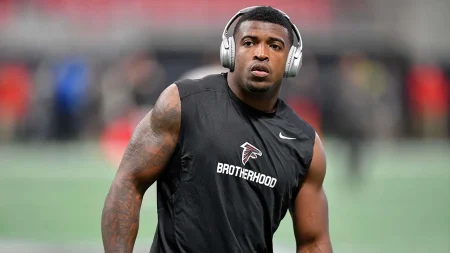The Miami Hurricanes face a critical moment regarding their College Football Playoff prospects following a surprising upset loss to the Syracuse Orange, which saw them squander a 21-0 lead and ultimately suffer a 42-38 defeat. This loss marked Miami’s second defeat in just three games, the other being against Georgia Tech, and it significantly impacted their standing in the College Football Playoff rankings. As a result of this performance, Miami was notably absent from the playoff bracket released by the selection committee prior to the conference championship weekend. The Hurricanes found themselves as the first team left out, placing them in a precarious position for playoff consideration.
The committee ranked the three-loss Alabama Crimson Tide at No. 11, despite their defeats to teams like Vanderbilt, Tennessee, and Oklahoma. This inclusion of Alabama, which has significant historical prestige and a generally strong performance record, adds to Miami’s challenges. As the Atlantic Coast Conference (ACC) continues to navigate its way through postseason possibilities, it appears only one team from the conference may earn a spot in the playoffs. Although SMU stood at No. 3 in the bracket, there are concerns that a loss to Clemson in their upcoming conference title game could eliminate them from contention altogether.
ACC commissioner Jim Phillips expressed disappointment over Miami’s steep decline in the rankings. He pointed out that the Hurricanes have secured more wins and fewer losses than teams ranked ahead of them in the bracket, citing their dominant victory over an SEC opponent as an example of their capabilities. Despite two narrow losses by a combined nine points—one to a ranked Syracuse team and another against Georgia Tech, which recently pushed No. 5 Georgia to eight overtimes—Phillips is advocating for a reassessment of Miami’s place in the rankings. He looks forward to the upcoming conference championship games as pivotal moments that could influence playoff slots for ACC teams.
Warde Manuel, the chair of the CFP selection committee, provided insights on why Alabama received a ranking advantage over Miami. He highlighted the evaluation of team performances, indicating that Alabama’s record against current top 25 teams and their overall performance against teams with winning records played critical roles in their ranking. Specifically, Alabama boasts a 3-1 record against top 25 teams, contrasting with Miami’s lack of victories against such opponents. Additionally, Alabama’s performance against teams above a .500 record (6-1) outshines Miami’s 4-2 record. Given that Miami has lost more recently and suffered two losses in their last three games, the decision to rank Alabama higher seemed justified from the committee’s perspective.
Despite the current ranking landscape, Manuel noted that future outcomes, especially from conference championships, could still reshape the playoff picture. The results of these critical games could have implications for how the committee views various teams moving forward. With Clemson and SMU on the verge of competing for the ACC title, their performance will not only affect their standings but could also impact Miami’s chances of sneaking back into the playoff conversation, especially if they manage to upset expectations.
As the season reaches its climax, the Miami Hurricanes find themselves at a crossroads, confronting the realities of their disappointing loss to Syracuse and striving for a path to redemption. The discourse surrounding their playoff fate reflects broader concerns about the competitive nature of college football and the intricacies involved in the playoff selection process. With the stakes so high, the upcoming conference championship weekend becomes not just a pivotal moment for Miami, but a defining one for the entire ACC and its representation in the national playoff race.










